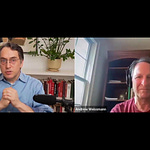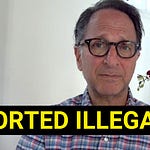Today,
and I sat down to unpack a newly declassified intelligence document that directly undercuts the basis for the Trump administration’s invocation of the Alien Enemies Act. In this conversation, we walk through the memo in detail, examine its implications for current litigation, and consider how the courts—up to and including the Supreme Court—may respond to the disconnect between what the Department of Justice is claiming and what the Intelligence Community has actually assessed.This is a conversation about facts, credibility, and the rule of law. When government lawyers appear before a court, they are bound by legal precedent and by an obligation to tell the truth. What happens when the government’s own intelligence discredits the very foundation of its legal argument?
That’s the import of our discussion. Stay engaged. YouTube link, here.
–Andrew
P.S. Big news—Ryan Goodman has recently launched his own Substack. Be sure to subscribe to his newsletter for rigorous legal analysis, national security insight, and the kind of clear-eyed commentary we all need right now. I have, for all those reasons.
TRANSCRIPT
Andrew Weissmann:
Good morning, Ryan.
Ryan Goodman:
Good morning, Andrew.
Andrew Weissmann:
I’m Andrew Weissmann, as many of you already know, and I’m here with Ryan Goodman. We both teach at NYU Law School, and we wanted to talk to you this morning about a new document that was released yesterday. I actually had the chance to talk about it briefly on The Last Word with Lawrence O’Donnell. One of the benefits of live television—especially when you’re working with someone as nimble as Lawrence and his team—is that we were able to review the document quickly and get into it on-air.
But there’s no substitute for what we’re about to do now: have a much longer and more detailed conversation to get everyone up to speed on what the document says, why it matters for immigration cases currently being litigated across the country (including at the Supreme Court), and what we think the legal and policy implications might be. So let’s start with the basics, Ryan. What is this document? Who wrote it? And then we’ll move into the substance.
Ryan Goodman:
Great. So the document itself is a U.S. intelligence community product, specifically from the National Intelligence Council. It addresses the central question behind the President’s recent invocation of the Alien Enemies Act: what is the relationship between the Venezuelan government under Nicolás Maduro and the Venezuelan gang Tren de Aragua, or TDA?
Two quick points up front. First, the headline takeaway: the document directly contradicts a number of public statements, including claims in the Presidential Proclamation itself. It comes to a strong conclusion—by intelligence standards—that there is no connection between Maduro and TDA. In fact, TDA is in conflict with the Venezuelan government, reportedly engaging in fierce gun battles with government forces. So the idea that TDA is being directed by Maduro is fiction. And we’ll get into why that fiction was useful—as a legal pretext for invoking the Alien Enemies Act.
Andrew Weissmann:
Let me just pause you for a second, Ryan—not to tease the audience, but just to fill in some institutional background before we get into the juiciest quote. The National Intelligence Council operates under the Office of the Director of National Intelligence, or DNI. The current DNI, appointed by Trump and confirmed by the Senate, is Tulsi Gabbard. So this memo is coming from an agency that was created after 9/11 to coordinate national intelligence, and it’s headed by a Trump-aligned official.
The document is dated April 7, 2025, so it’s not a holdover from the Biden administration. It’s recent. It was released publicly on May 5, just under a month after it was produced.
Now, why does this matter? Why is the relationship between TDA and the Venezuelan government relevant? Because in order to invoke the Alien Enemies Act—and bypass the normal immigration process where due process is required—the administration had to show that there was either a war or an invasion by a foreign government, or that a foreign group was acting on behalf of such a government.
That’s the legal threshold. The Trump administration’s proclamation asserted that TDA was essentially a proxy of the Venezuelan government—Maduro’s operatives invading the U.S. That connection is what allowed them to claim the authority to seize and deport people under the Alien Enemies Act, skipping due process.
Ryan Goodman:
Exactly. The language that the government has used—both in the proclamation and in court filings—is that TDA is directed by Maduro and is acting in concert with him.
Here’s the most important line from the newly declassified document:
“The Maduro regime probably does not have a policy of cooperating with TDA and is not directing TDA movement to and operations in the United States.”
That’s the key conclusion.
The memo is about five pages long (there’s a sixth page, but it’s basically blank). That length is typical for assessments like this. It then goes on to support its conclusion with bullet points, including the fact that Venezuelan government forces have clashed with TDA.
There is one somewhat dissenting view in the intelligence community—from the FBI—but even that dissent doesn’t really contradict the main conclusion. It’s a rare instance of consensus across the intelligence agencies.
Andrew Weissmann:
Yeah. So I wanted to tease that out a little bit. When you read the full document, it’s clear that the intelligence community—aside from that one dissent from the FBI, which I’ll come back to in a moment—concludes that the Venezuelan government is not directing TDA movement to or operations in the United States.
If that’s the current state of the record, it directly contradicts both the Presidential Proclamation and the arguments DOJ lawyers are making in court to justify the invocation of the Alien Enemies Act.
There’s also a lot of nuance in the document. It suggests a very uneasy relationship between the Venezuelan government and TDA. You get the sense that these gangs are extremely powerful. While the government tries to control them at times, there’s also a kind of toleration or reluctant coexistence because the state lacks the capacity to fully eradicate them.
The memo also explains the FBI’s view—which is typical in intelligence community (IC) products where dissenting views are noted. The FBI’s assessment is more about individual government officials potentially cooperating with TDA, rather than the Venezuelan government as a whole directing or controlling the gang.
What it reads like is this: the FBI thinks there may be corrupt Venezuelan actors who are working with TDA, likely due to payoffs or bribery. But it’s not saying that TDA is acting on behalf of the government, or that it’s being used to carry out an invasion of the United States. That’s an important distinction.
When you and I have talked about this, we’ve speculated about what the administration might argue now. They could try to latch onto the fact that the intelligence community wasn’t completely uniform. But even if they highlight the FBI’s dissent, that portion still doesn’t go far enough to support what they’d need for legal purposes.
There’s also the irony, of course, that the President would lean on the FBI’s view—an agency he’s historically attacked as untrustworthy—because now it might seem closer to his position. But even then, the FBI’s take, as summarized in this document, doesn’t give them what they need. It doesn’t say that TDA is operating as a proxy or an arm of the Venezuelan government.
So, if they want to make that case, they’d have to argue two things:
That there’s information not included in this memo—perhaps in other documents—that aligns with their position.
That the President is entitled to reach his own judgment, independent of the intelligence community, and that courts should give that judgment broad deference.
Obviously, what would help him most is some factual basis for the claim. This is similar to the election fraud claims: you can say whatever you want, but courts will want to see something to back it up. Some judges might say they have no role in reviewing those claims, but others will say there has to be at least a facially valid reason for what the President is asserting.
So, Ryan, what’s your take on that? How do you think the administration might try to get out of this predicament? And how do you think courts might respond?
Ryan Goodman:
Sure, and let me add two more pieces about the document itself—one directly related to your question.
First, for those familiar with how the intelligence community frames these assessments, they usually include confidence levels—low, moderate, or high. While this document doesn’t explicitly label its conclusions with a confidence level, I thought the language used was strong and suggestive of high confidence.
Here are a couple lines that stood out:
“Venezuelan intelligence, military, and police services view TDA as a security threat and operate against it in ways that make it”—and here’s the key phrase—“highly unlikely the two sides would cooperate in a strategic or consistent way.”
Another line:
“The IC has not observed the regime directing TDA, including to push migrants to the United States, which probably would require extensive coordination and funding between regime entities and TDA leaders that we would collect.”
Meaning: if that kind of coordination were happening, they’d have detected it. But they haven’t. They’ve seen nothing.
Andrew Weissmann:
And that’s what the government, the DOJ, and the President are now up against—because this is a declassified, public document.
Trying to latch onto the FBI’s view is one possible route, but it’s incredibly difficult to make that work. If you were to do a “copy-paste” comparison between what the DOJ is saying in court today and the FBI’s assessment here—it doesn’t hold up.
The DOJ’s proclamations can’t just pivot to: “Well, some Venezuelan officials are getting kickbacks from TDA.” That’s not enough. That’s not the same as saying TDA is operating at the direction of Maduro as a de facto arm of the Venezuelan state. The two positions don’t align.
There’s also a finer legal point I’ve been thinking about. I’d love for Just Security to bring in an international law expert to break this down: What does international law actually say about when a non-state actor’s actions can be attributed to a foreign government?
There are specific tests for attribution. And I’ll be careful here—because my law students are currently taking an exam with questions about this very topic! But the bottom line is: the bar for attribution is already high.
And even before this memo came out, the DOJ’s arguments struggled to meet that bar. Add this declassified document, and even the FBI’s dissent doesn’t come close to meeting the legal threshold for attributing TDA’s actions to the Venezuelan state. It’s just not there.
Andrew Weissmann:
Ryan, are you saying that people listening to this conversation might do very well on your exam?
Ryan Goodman:
(Laughs) One way or the other!
Andrew Weissmann:
Yeah. Before we get into how the courts might respond, I want to read aloud a key line about the FBI in the report so people can understand what the Trump administration is likely to lean on.
Now, I do think there’s some data we’re missing—specifically, the full underlying intelligence report from the Bureau. But here’s the key excerpt from the declassified memo:
“While FBI analysts agree with the above assessment…”
And that’s really critical. That means the FBI is not dissenting from the main intelligence community’s view that there is no coordination between TDA and the Venezuelan government.
But then it adds a nuance:
“…they assess some Venezuelan government officials facilitate TDA members’ migration from Venezuela to the United States, and use members as proxies in several countries—including the United States—to advance what they see as the Maduro regime’s goal of destabilizing governments and undermining public safety, based on DHS and FBI reporting as of February 2024.”
So, one thing to note here is that the administration will be relying on reporting from both DHS and FBI—under the Biden administration. Of course, logical consistency is not the President’s strong suit, so I doubt that will give him pause.
That’s the kind of language the administration will likely try to elevate. I agree with you, Ryan, that it doesn’t match what’s being said in court. But again, you’re applying a logic and consistency standard that seems outdated in today’s political environment.
It’s not unusual for an administration to change legal interpretations, but what we’re seeing here isn’t a new administration with a new approach. It’s a flip-flop within the same administration, directly contradicting their public and legal statements to the courts.
Ryan Goodman:
Yeah, and I think the courts will need to grapple with two main questions.
First, if the administration comes forward and says, “We still have a sufficient basis for invoking the Alien Enemies Act—and we’re relying on the FBI assessment,” they’ll argue that great deference should be given to the President, especially when there’s a split in intelligence community views.
Second, courts will also have to reckon with the fact that the government has made inconsistent statements in its prior legal filings—statements that are unsupported by the FBI assessment and directly contradicted by the broader intelligence community’s analysis.
In those documents, the government portrayed the TDA as being directed by Maduro and functioning as a hybrid regime. That language is no longer defensible, and I wouldn’t be surprised if some plaintiffs file new motions today based on this memo.
As for how courts might respond: some might invoke the political question doctrine, arguing that these determinations lie solely within the executive branch. Others might not go that far, but still grant great deference to presidential discretion.
However, this situation is unusual because we now have a declassified intelligence document on the public record. That changes the equation. It’s no longer a matter of courts being asked to blindly trust the executive—it’s right in front of them. And what’s in front of them undermines the government’s claims.
Andrew Weissmann:
Exactly. What you’re describing is a classic collision between the administration’s overreach and the legal concept of the presumption of regularity—the assumption that government actions are lawful and properly reasoned unless shown otherwise.
But now, with this document, we’re seeing that presumption start to crack.
And just so everyone understands, the political question doctrine means that if something is seen as a matter of policy or foreign relations, the courts will often step back and defer to the executive. They say, “We don’t judge policy—we handle legal and constitutional questions.”
This came up in a case out of Texas—the first that actually reached the merits of whether the Trump administration properly invoked the Alien Enemies Act. The court there looked at the statute, which requires either a state of war or an invasion involving a foreign government or its agents.
It compared that to what was in the President’s proclamation and found that the proclamation didn’t meet the statute’s requirements. I believe on page 18, the court even said, “This could be a political question,” but ultimately held that the legal threshold wasn’t met.
So it’s a narrow ruling, but it actually lays out a roadmap for how the administration might rewrite the proclamation—if they ignore the facts, or if they try to adjust the language while still lacking any real evidence.
And that’s the problem. If they attempt a second try that contradicts what we now know from the intelligence community, courts may not be so forgiving.
At some point, a judge is going to say: “Show me any factual basis.” Because political question doctrine doesn’t mean the courts have to accept outright falsehoods. Imagine if you had a recording of someone in the administration saying, “I’m lying in this proclamation—we’re making it up for the courts.” Would the court still defer? That can’t be the standard.
And I know some people hearing this are probably frustrated with how cautious the courts can be. But I want to emphasize: the reason these doctrines exist is precisely because courts often defer to the executive branch. The attacks on judges—that they’re activist or overstepping—are simply wrong here.
What we’re arguing is that courts need to have some line—some limit on deference—when the executive branch is knowingly misleading them. And I think that’s where the administration’s credibility problems, its factual misrepresentations, and its legal overreach could really hurt them.
Ryan Goodman:
Yeah.
A couple thoughts on that. First, the Texas case you mentioned—the ruling by Judge Rodriguez in the Southern District—already gave the President an extremely deferential reading of his powers.
But if it were to go up on appeal, I think the Supreme Court wouldn’t necessarily uphold it, because there’s precedent that courts can review foreign policy-related determinations, including questions of recognition of foreign governments.
And now we’re in a situation where everyone knows what’s actually going on. Courts operate in the real world. The public legitimacy of these decisions matters. It’s very difficult to say, “We’re going to defer to this document,” when that same administration has publicly released a memo that directly contradicts its claims.
It’s as if they declassified a document saying “the sky is blue,” while continuing to insist—on paper and in court—that the sky is greenAndrew Weissmann:
To me, Ryan, this feels in many ways like a test—similar to the so-called Muslim ban case that we both teach about, which was one of the first major legal challenges in the Trump 1.0 administration.
That policy went through several iterations before it reached the Supreme Court, where the justices ultimately upheld it. And while there were dissents, the majority didn’t justify the blatant xenophobia and discriminatory statements made by then-candidate Trump. Instead, they sidestepped reality and treated it as though any president could have issued such a proclamation, regardless of the intent or context.
There was a kind of unreality to that decision—essentially saying, “We’re not going to look at the actual motivations or what we know happened.” I’m not sure that approach will fly this time.
For one thing, I don’t think any other president would—or could—do what’s being done here. And I don’t think the Court can continue to ignore the factual record in the way it did before.
This case—whether the Alien Enemies Act is being lawfully invoked in relation to the TDA—is almost certainly going to end up before the Supreme Court. In fact, a stay is already in place in a Texas case involving people subjected to this invocation, and we’ll likely see challenges related to due process as well.
But the central legal issue—can the Alien Enemies Act even be invoked in this way?—that’s likely to go all the way up.
One last thing I want to flag is a specific case involving a husband and wife. The government claimed they were part of a gang and tried to remove them. But this time, they actually got a hearing.
The court looked at the evidence and basically said, “You’ve got to be kidding.” It didn’t even meet a civil preponderance standard. The case was built on double or triple hearsay and completely fell apart.
That’s why due process is so important. We’re now dealing with a document that says the factual basis for linking this gang to the Venezuelan government may not even exist.
And then, in cases where the government did get a hearing and had the opportunity to prove someone was part of a gang like TDA, they couldn’t do it. That shows just how weak their case is.
What’s even more disturbing is that this isn’t just about removing someone from the U.S.—they’re being sent to foreign prisons, potentially for life. Under this theory, the government could scoop up anyone without due process, deport them, and then disavow any responsibility once they’re gone.
Ryan Goodman:
Yeah, and there are a few other cases just like that.
Take the Abrego Garcia case. That’s actually about an MS-13 allegation—not TDA under the Alien Enemies Act—but the facts are striking. The district court judge, Paul A. Engelmayer, said the government had presented no evidence that Abrego Garcia was part of MS-13, even though Trump officials had said publicly that he was.
Another case is the GOP case, where Judge Stephanie Gallagher—a Trump appointee—also said the government presented no evidence that the individual was a TDA member. She emphasized, “This court is a court of evidence.”
If the government is going to claim someone is a public safety threat and remove them under the Alien Enemies Act, they have to show something. And they haven’t.
Now, some people might wonder about the timeline here—because the document we’ve been discussing is dated April 7. You might think, “Well, maybe the government’s earlier statements came before this assessment.” But here’s the chronology that clears that up:
Feb. 26: The initial intelligence assessment is made, including the FBI’s dissent, according to The New York Times.
March 14–15: The President signs and publicly issues the proclamation invoking the Alien Enemies Act, even though it contradicts the Feb. 26 assessment.
March 20: The New York Times reports that the intelligence community’s assessment contradicts the administration’s claims.
April 1: DOJ files a court brief repeating the same claims.
April 7: The National Intelligence Council memo is officially finalized.
April 23: In the Texas case, a judge rules that the invocation of the Alien Enemies Act is unlawful. On that very same day, DOJ submits a brief again claiming TDA is acting under Maduro’s direction—after the April 7 memo.
That shows how deeply invested DOJ has been in a narrative that contradicts the intelligence community.
One final piece—The New York Times last night (via Charlie Savage) reported on the memo and also quoted public statements from Attorney General Bondi and Deputy Attorney General Todd Blanche. Blanche claimed the NYT story was “inaccurate,” and Bondi went on TV to discredit the reporting.
Andrew Weissmann:
Let me put a fine point on that. The New York Times got it right.
This is a separate but critical issue. When the Times first reported on this story—before the memo was public—the DOJ, through its top two officials, denied the report. They said it was wrong.
Now we know it wasn’t. The Times was right.
So it’s not just misrepresentations to the courts. We’re also seeing deliberate disinformation aimed at the press and public. And now, with the memo declassified, it’s clear that the Attorney General and Deputy Attorney General were caught red-handed.
This is the disinformation campaign playing out in real time—and it’s unraveling.
There’s obviously much more that will develop from this. As you said, Ryan, legal filings could happen as early as today. The government’s going to be scrambling.
Thanks to everyone who stuck with us—this was a long one, but we hope it’s been worth it. You’re going to see this play out in the lower courts and potentially at the Supreme Court, and this document will be central to that.
Stay tuned—we’re both on Substack and YouTube. Big shoutout to Just Security, where we both contribute—Ryan much more deeply, of course, as Co-Editor-in-Chief.
Thanks again for the discussion, Ryan.














